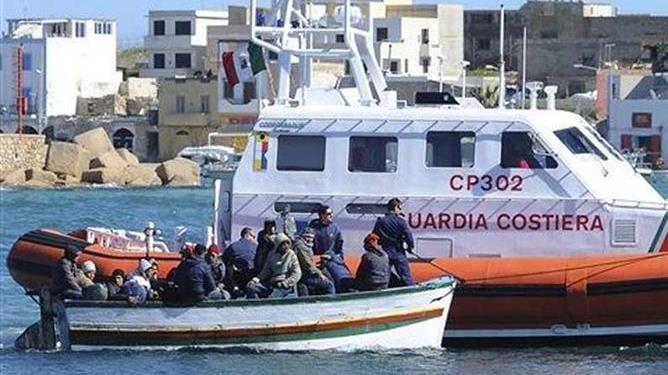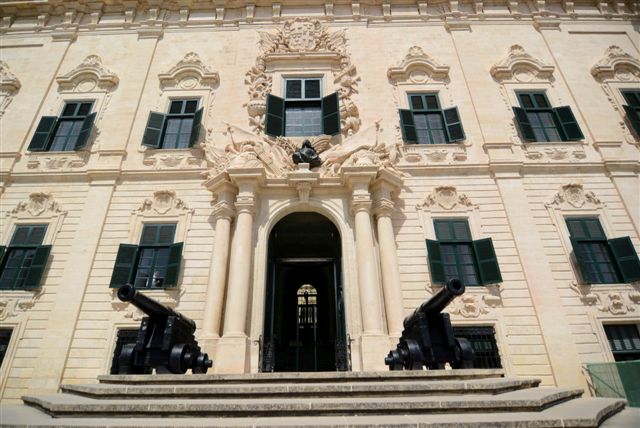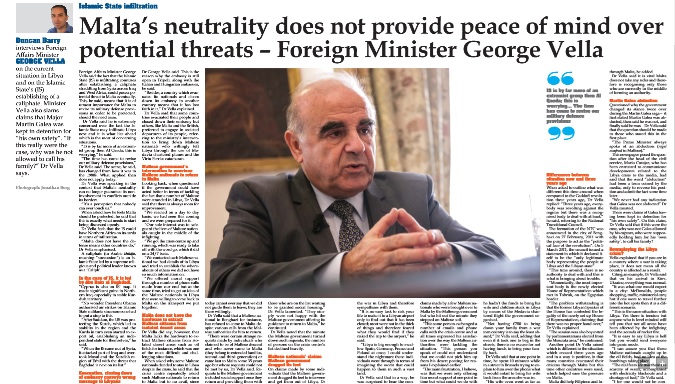Foreign Affairs Minister George Vella said the fact the Islamic State (ISIS) is infiltrating countries after establishing a caliphate straddling from Syria across Iraq and West Africa, could pose a potential threat to Malta eventually. This, he said, means that it is of utmost importance for Malta to revise its military defence provisions in order to be protected, should the need arise.
Dr Vella said he is extremely concerned over the fact the Islamic State may infiltrate Libya next and it is what lies ahead which is the most of concerning situations.
“IS is by far more of an extremist group then Al Qaeda; this is worrying,” he said.
“The time has come to revise our military defence provisions,” Dr Vella said. The scene, he said, has changed to how it was in the ‘80s. What applied then does not apply to today’s circumstances.
Dr Vella was speaking in the context that just because Malta is a neutral country it in no way means that it will remain untouched.
“It’s a perception that nobody can ever touch us.”
When asked who he feels Malta should be protected, he said that this is exactly what needs to start being discussed openly.
Dr Vella feels that the IS could have Northern Africa on its cards in terms of infiltration.
“Malta does not have the defence means other countries do,” Dr Vella emphasised.
A caliphate (in Arabic khilafa, meaning “succession”) is an Islamic State led by a supreme religious and political leader known as a ‘Caliph’.
In the case of IS, it is led by Abu Bakr al Baghdadi.
“Cyprus is also on Isis’ map, it made significant gains in Northern Iraq, especially in stable Kurdish territory.
“No wonder President Obama authorised air strikes on Islamic State militants since someone had to put a stop to this.
“After Saddam, the US was protecting the Kurds which led to stability in the region and the Kurds in turn even started to export oil, establishing an independent state for themselves,” he said.
“When the IS came out of Syria it attacked part of Iraq and overtook Mosul and the Kurdish region of Erbil with the threat that Baghdad is next on its list.”

Evacuation, closing down of embassy conveys wrong message to Libyans
If Malta evacuated Maltese nationals and closed down its embassy in Libya it would convey the wrong message to Libyans, Dr George Vella said. This is the reason why the embassy is still open in Tripoli, along with the Italian and Hungarian embassies, he said.
“Besides, a country which evacuates its nationals and closes down its embassy in another country means that it has lost faith in it,” Dr Vella explained.
Dr Vella said that some countries evacuated their people and closed down their embassy but others, like Malta and the British, preferred to engage in assisted departures of its people, referring to the ministry’s intervention to bring down Maltese nationals who willingly left Libya through the use of Medavia chartered planes and the Virtu Ferries catamaran.

Maltese government’s intervention to convince Maltese nationals to return to Malta
Looking back, when questioned if the government could have acted better in terms of tackling the fact that a number of Maltese were stranded in Libya, Dr Vella said that there is always room for improvement.
“We reacted on a day to day basis; we had seen this coming and we were prepared for it.
“Our sole interest was to safeguard the lives of Maltese nationals caught in the middle of the infighting.
“We got the crisis centre up and running which was ready to take off with the word go, which it did on a 24/7 basis.
“We contacted each Maltese national we had details of in Libya and tried to establish the whereabouts of others we did not have so much information on.
“We offered moral support through a number of phone calls made from our end but at the same time tried to get an idea of who the Maltese nationals in Libya were who were willing to come back to Malta through the means of transportation we put together.
Malta does not have the hardware to extract Maltese citizens from isolated desert areas
Dr Vella did say, however, that Malta lacks the hardware to extract Maltese citizens from isolated desert areas such as oil fields for instance, which was one of the most difficult and challenging situations.
When asked why some Maltese nationals decided to stay in Libya despite the crisis, he said that the crisis centre repeatedly asked such Maltese nationals to return to Malta but to no avail since most have business interests, or families there.
“All I can say is that the Maltese nationals who are still in Libya today cannot ever say that we did not guide them to leave Libya and they are there willingly.
Dr Vella said that a Maltese national in Benghazi for instance has refused to come to Malta despite various calls from the Maltese authorities to come back to Malta.
“There were certain strange requests made by individuals who claimed to be of Maltese descent and who never came to Malta (they belong to extended families, second and third generation) or came last to Malta some 35 years ago but whose requests could not be met by us, Dr Vella said. Requests to the Maltese government included social support once they return and providing them with accommodation (even as far as requesting hotel accommodation in Malta and social housing).
“We can hardly accommodate those who are on the list waiting to be granted social housing,” Dr Vella lamented. “They simply were not happy with the Maltese government offering its guidance to return to Malta,” he continued.
Dr Vella noted that the minute the Maltese government turned down such requests the number of persons on the crisis centre list declined heavily.

Maltese nationals’ claims Maltese government dragged its feet
On claims made by some individuals that the Maltese government dragged its feet to intervene and get them out of Libya, Dr Vella said that he could well understand the emotional and psychological stress such individuals had been through as a result of the war in Libya and therefore sympathises with them.
“It is no easy task to risk your life to make it to a Libyan airport only to find out that it has been closed; most were not in the thick of things and therefore feared what they would find if they risked the trip to the airport,” he said, referring to the closure of airports in Libya.
“Libya is big enough to swallow Spain, Germany, France and Poland at once; I could understand the nightmare these individuals went through in terms of imagining the worst that could happen to them in such vast land.
Dr Vella said that in a way he was surprised to hear the comments made by an individual to the media on his arrival to Malta.
Dr Vella was replying to questions made by this newspaper on claims made by a few Maltese nationals who were brought over to Malta by the Maltese government but who hit out the minute they stepped on Maltese soil.
“This same person exchanged a number of emails and phone calls with the crisis centre and at all times expressed his satisfaction over the way the Maltese authorities were tackling the situation. “This person you speak of could not understand that we could not pick him up from his desert posting for reasons I explained earlier.
“His main frustration, I believe, was that we were only offering him moral support at one point in time but what could we do with the restricted resources we have?” Dr Vella said.
He also referred to a separate case where an individual claimed he hadn’t the funds to bring his wife and children stuck in Libya by means of the Medavia chartered flight the government organised.
“Not having €780 to bring down your family from a war torn country is to say the least absurd,” Dr Vella said, adding that even if it took one to beg in the streets, there is no excuse for not having funds to bring your family back.
Dr Vella said that at one point in time, he spent 10 minutes while in a street in Brussels trying to explain to him over the phone what it would entail to bring his wife back from the area she was in.
“His wife even went as far as taking her children in the thick of it, an airport road, an action strongly advised against,” Dr Vella said.

Differences between situation now and three years ago
When asked to outline what was different this time around when compared to the Gaddafi revolution three years ago, Dr Vella replied: “Three years ago, everybody was revolting against the regime but there was a recognised body to deal with at least,”he said, referring to the National Transitional Council.
The formation of the NTC was announced in the city of Benghazi on 27 February, 2011 with the purpose to act as the “political face of the revolution”. On 5 March 2011, the council issued a statement in which it declared itself to be the “only legitimate body representing the people of Libya and the Libyan state”.
“This time around, there is no authority to deal with and this is what is bringing about trouble.
“Momentarily, the most important body is the newly elected House of Representatives which met in Tobruk, on the Egyptian border.
“The problem withstanding is that the former Libyan Speaker of the House has contested the legality of the newly set up House of Representatives, claiming that there was no proper hand over,” Dr Vella explained.
“The session was also boycotted by parliamentarians elected from the Misurata area,” he continued.
Another point Dr Vella raised which is different to the situation which ensued three years ago and in a way is positive, is that many countries evacuated their citizens through Malta but this time other countries used Tunisia, which helped ease the pressure on Malta.
Malta did help Filipinos and Indians to get out of Libya but the numbers are nothing compared to the number of foreign nationals evacuated three years ago through Malta, he added.
Dr Vella said it is vital Malta does not take any sides and therefore is recognising only those who are currently in the middle of forming an authority.

Martin Galea abduction
Questioned why the government changed its stance two times over when it first stated Martin Galea was abducted, then said he was not, and finally saying he was, Dr Vella said that the question should be made to those who stated this in the first place.
“The Prime Minister always spoke of an abduction (ragel maqbud in Maltese).”
This newspaper posed the question after head of civil service Mario Cutajar, who has been entrusted to communicate developments related to the Libya crisis to the media, had said that the word “abduction” had been a term coined by the media, only to reverse his position and admit the fact some time later.
“We never had any indication that Galea was not abducted” Dr Vella insisted.
There were claims of Galea having been kept in detention for “his own safety”. On this claim, Dr Vella said that if this were the case, why was not Galea allowed by his captors, who were supposedly holding him for his ‘own safety’, to call his family?
Downplaying the Libya crisis?
Vella explained that if you are in a country where a war is taking place, it does not mean all the country is affected as a result.
Citing an example, Dr Vella said that on his arrival in Kiev, Ukraine, everything was normal.
“It was what one would expect in a city: McDonalds, people shopping, traffic, ministerial cars; but if one were to travel further into the hot spots then it is a different scenario.
“This is the same situation with Libya. Yes there is tension but anyone who is level minded will tell you that not all areas have been affected by the infighting and the sounds of rocket fire.
“It is easy to say Libya is hell but you would send everyone into panic mode.
“I can assure you that those Maltese nationals caught up in the oil fields, had no idea of the bombings taking place.
“The real fears are that there is a scarcity of water, accompanied with electricity blackouts and a shortage of fuel,” Dr Vella said.
“I for one would not be comfortable in such a setting but there are others who are not as sensitive to the sounds of rocket fire,” he said.